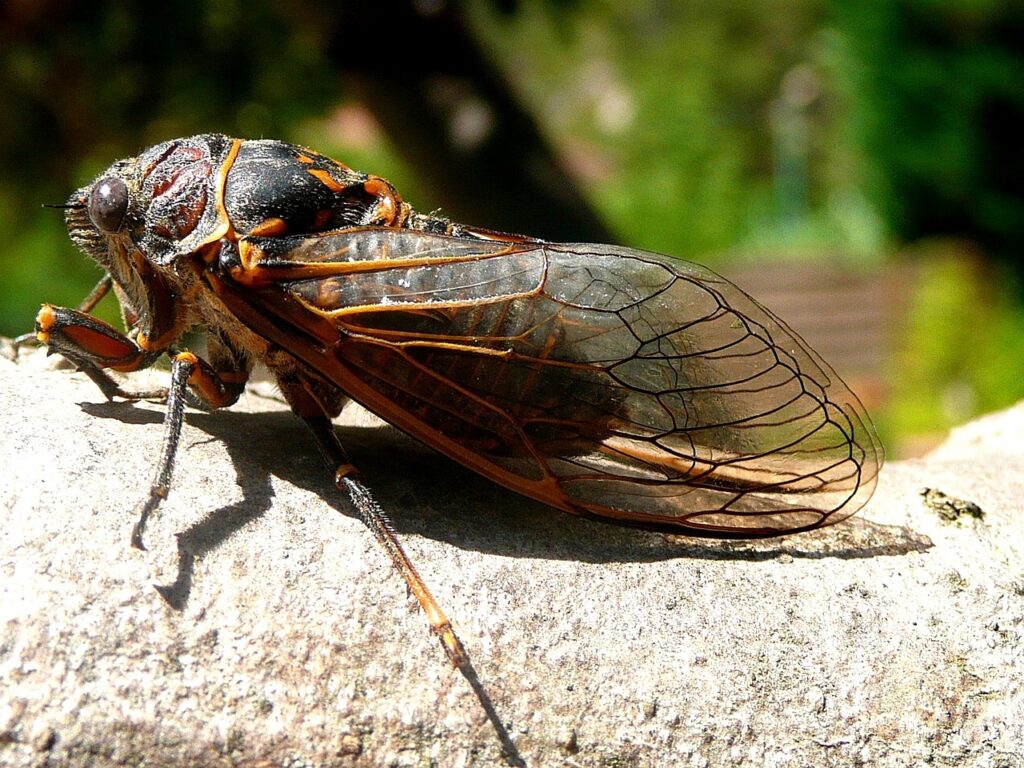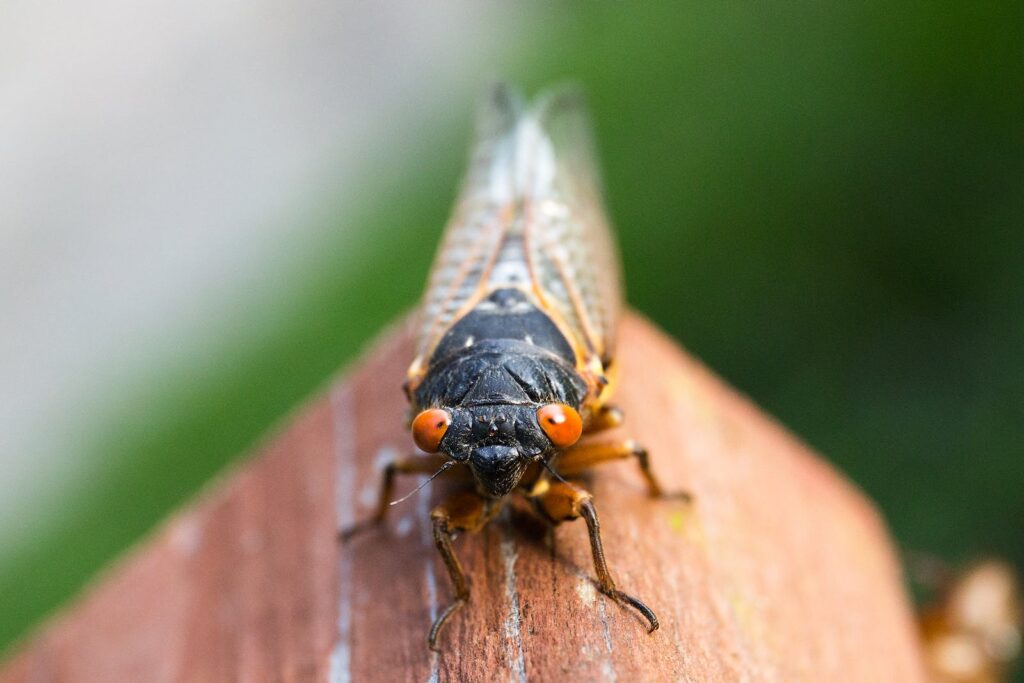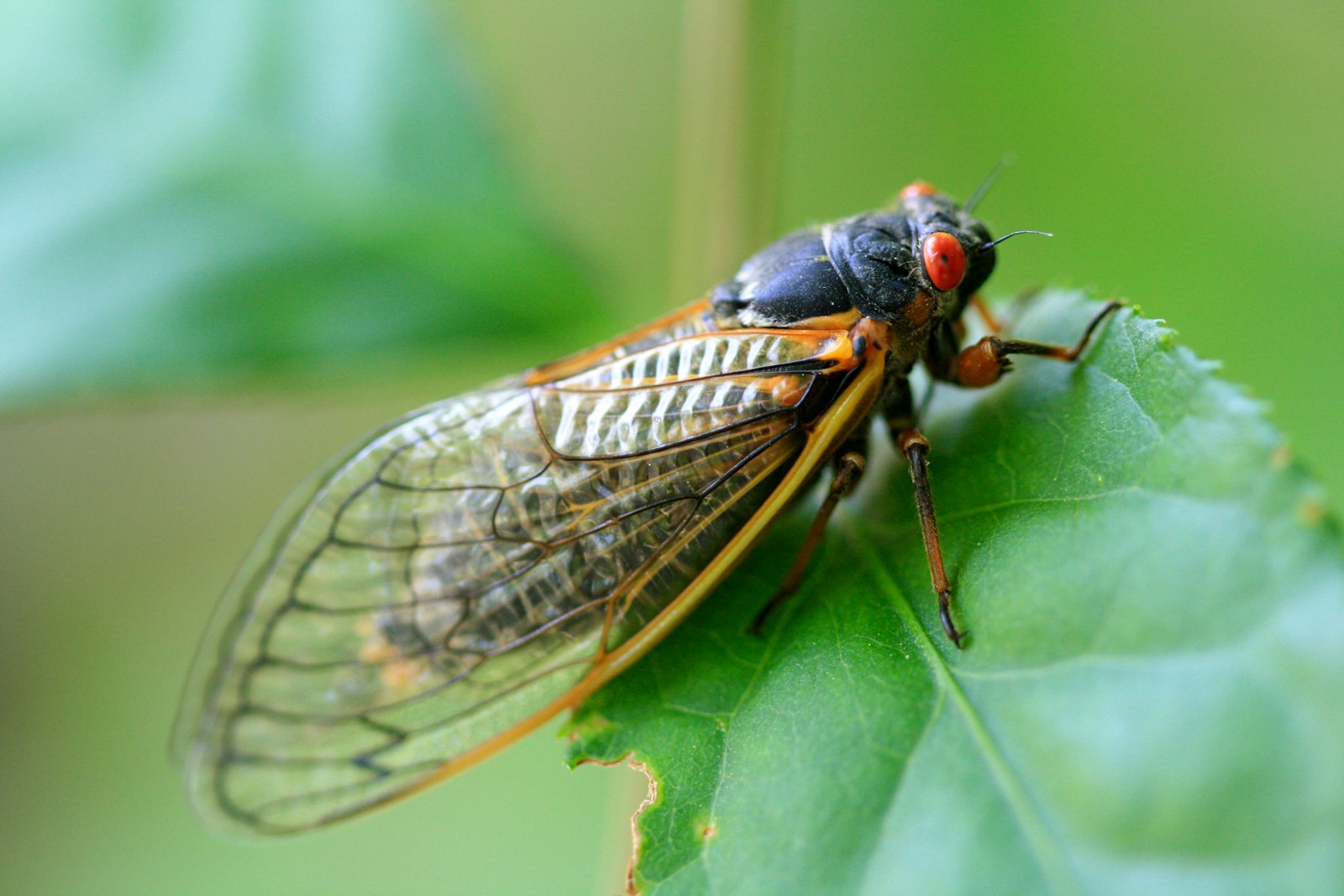Can Chickens Eat Cicadas
Feeding cicadas to chickens is generally safe, but it’s important to take certain precautions to ensure the well-being of the chickens. When it comes to cicadas, chickens are known to have a preference for these insects due to their taste and nutritional benefits. However, there are a few safety considerations to keep in mind.
First of all, cicada shell digestion can be a concern for chickens. The hard exoskeleton of cicadas may pose a challenge for chickens to break down and digest. To aid in digestion, it’s recommended to provide chickens with adequate grit, which helps grind down the hard wings of cicadas.
Secondly, while cicadas are nutritious for chickens, it’s essential to follow cicada feeding guidelines. Chickens should consume cicadas in moderation, as with any other food. The quantity of cicadas a chicken can eat depends on its size. On average, chickens can consume about 2 pounds of cicadas per day, but larger cicadas should be limited to a pound per day. For molting chicks, half a pound of cicadas daily is sufficient.
Lastly, when it comes to cicada safety for chicks, precautions should be taken. One-day-old chicks shouldn’t have cicadas as their main diet due to the hard shells. It’s recommended to wash and rinse cicadas before feeding them to chicks, making them safer to digest. Additionally, chicks should be given smaller-sized cicadas to prevent choking, taking into consideration their size and age.

Nutritional Benefits of Cicadas for Chickens
With the safety considerations in mind, let’s explore the nutritional benefits that cicadas offer to chickens. Cicadas are not only a delicious treat for chickens but also provide several key nutrients that contribute to their overall health and well-being. Here is a table outlining the nutritional benefits of cicadas for chickens:
| Nutrient | Amount per serving |
|---|---|
| Protein | High |
| Fat | Low |
| Carbohydrates | Low |
| Fiber | High |
| Antioxidants | Rich |
Cicadas are a sustainable protein source for chickens, making them a valuable addition to their diet. They are rich in protein, containing around 43 grams per serving, and low in fat and carbohydrates. The fiber content in cicadas helps keep chickens full, while the antioxidants contribute to reducing inflammation and boosting the immune system. Additionally, the chitin found in cicadas’ exoskeleton acts as a source of fiber and enhances the immune response in chickens.
Incorporating cicadas into a chicken’s diet not only provides essential nutrients but also supports cicada farming and natural pest control. Understanding the cicada life cycle and different species of cicadas can help farmers produce an abundant supply of these nutritious insects for their chickens. Overall, feeding chickens cicadas is a sustainable and beneficial practice that promotes their health and contributes to pest control.
Feeding Quantity of Cicadas for Chickens
To determine the appropriate feeding quantity of cicadas for chickens, it’s important to consider the size and stage of the chickens. Here are some guidelines to follow when feeding cicadas to chickens:
- Consider the size of the chickens: The amount of cicadas a chicken can eat depends on its size. Larger chickens can consume about 2 pounds of cicadas per day, while molting chicks should eat half a pound of cicadas daily.
- Limit the portion size: Large-sized cicadas should be limited to a pound per day for chickens. It’s important to feed cicadas to chickens in moderation, like any other food.
- Benefits of cicada consumption: Chickens can benefit from the nutrients and fibers found in cicadas. They’re a delicious and nutritious treat for chickens, as they’re low in fat and high in protein. Consuming cicadas can also protect chickens from parasitic infections.
- Potential risks of feeding cicadas: While cicadas are generally safe for chickens, it’s important to avoid feeding them cicadas that have been exposed to pesticides. Additionally, young chicks shouldn’t have cicadas as their main diet due to the hard shells. Proper preparation of cicadas, such as washing and rinsing them, can make them safer for chickens to digest.

Safety Precautions for Feeding Cicadas to Chicks
When feeding cicadas to chicks, it is important to take safety precautions to ensure their well-being. Cicadas can be a nutritious treat for chicks, but there are a few things to keep in mind. Here are some safety precautions to consider:
| Safety Precaution | Description | Importance |
|---|---|---|
| Feeding in moderation | Chicks should consume cicadas in moderation, like any other food. | Prevents overfeeding and maintains a balanced diet. |
| Size-appropriate cicadas | Chicks should be given smaller-sized cicadas to prevent choking. | Avoids choking hazards and promotes safe consumption. |
| Washing and rinsing cicadas | Cleaning cicadas can make them safer for young chicks to digest. | Removes any potential contaminants and improves safety. |
Bugs That Chickens Should Avoid
After discussing the safety precautions for feeding cicadas to chicks, it’s important to be aware of the types of bugs that chickens should avoid. Chickens can come into contact with various harmful bugs and dangerous insects that can pose a risk to their health and well-being.
Here are four types of bugs that chickens should avoid:
- Blister beetles: These beetles contain a toxic substance called cantharidin, which can damage a chicken’s digestive tract if ingested.
- Brown recluse spiders: These spiders can bite chickens and cause tissue death, leading to serious health issues.
- Wasps: Even when dead, wasps can still sting chickens and be difficult for them to digest.
- Slugs: Slugs produce slime that can cause choking in chickens if consumed in large quantities.
It is important to keep chickens away from these harmful critters to ensure their safety. Regular monitoring of the chicken coop and surrounding areas can help prevent encounters with these risky bugs.
Conclusion
In conclusion, feeding cicadas to chickens can provide them with a delicious and nutritious treat that’s rich in protein and low in fat. Cicadas offer essential nutrients and fibers that promote overall health, making them a beneficial addition to a chicken’s diet.
However, it’s important to feed cicadas in moderation, taking into consideration the size and age of the chickens. Additionally, precautions should be taken when feeding cicadas to chicks, and other types of bugs should be avoided to ensure the safety and well-being of the flock.

